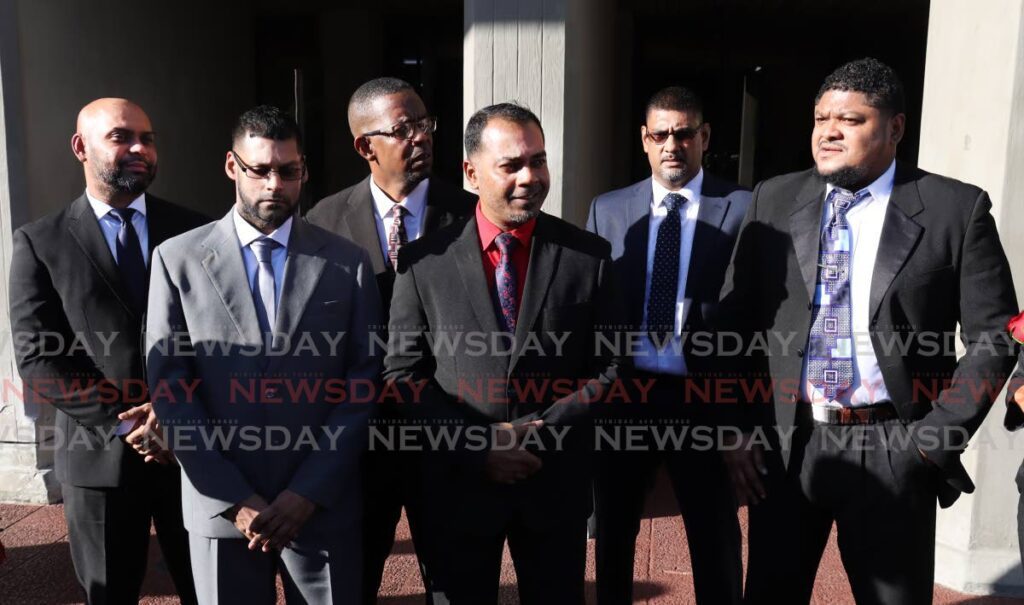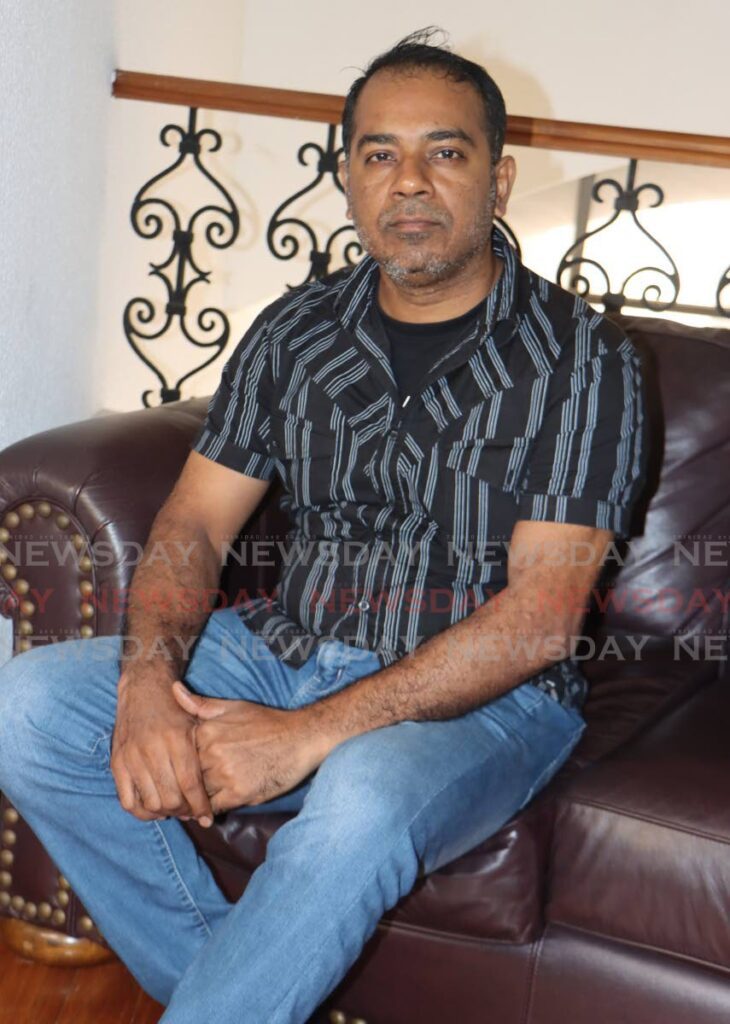4,408 days to freedom - cop tells all after freed of Moruga triple murders

If he could go back in time, there’s one thing Sgt Khemraj Sahadeo would have changed on July 22, 2011.
His usual strong voice melts to a whisper.
“I was home and got a phone call instructing me to report for duty. My wife said, ‘Don’t go to work tonight.’
"It was the first time she ever said that.
I wish I had listened to her.”
A police exercise on that night for the robbery squad working out of the San Fernando police station led to murder charges for Sahadeo and PCs Renaldo Reviero, Glenn Singh, Roger Nicholas, Safraz Juman, Antonio Ramadin and WPC Nicole Clement.
The exercise they were on led to the shooting deaths in Barrackpore of Alana Duncan, 28, Abigail Johnson, 23, and Kerron “Fingers” Eccles.
When Clement cut a plea bargain and turned state witness, Sahadeo and the other five officers ended up sharing two adjacent cells in Maximum Security Prison (MSP), where they waited for their trials with 35 other men in MSP’s serviceman division, reserved for remanded police, prison and fire officers and soldiers.
In prison, Sahadeo saw men he had arrested.
“In the beginning, the welcome wasn’t nice. We were six well known officers in San Fernando. During airing, inmates we had cases against heckled us.”
Sahadeo soon enrolled in a a self-esteem programme, music and academic classes. He joined Team Intellect, the MSP debate team.
“The debates proved to John Public that there are intelligent people in prison,” he said.
Sahadeo’s solid arguments, delivered in a well-modulated voice, earned him one of seven positions on the all-star prison debate team formed from all ten prisons in 2017-2019.
During the pandemic, he taught adult literacy classes. Over time he received ten O-level passes.
Born in San Fernando, Sahadeo grew up in a “humble home with no electricity. My father and all of my relatives worked in the canefields. Sometimes I had to stay home from school to work with cane. It was our life and our income.”
Sahadeo said he never resented working in the canefields.
“It was a way of earning responsibility from the time I turned 12.”
In 1996, when Sahadeo was 18, his mother, just 38, died after a stroke.
“My dad took care of his five children.” (Two of his brothers died and he has two sisters).
Sahadeo was the first person in his family to complete secondary school. He earned five O-levels, in maths, English, social studies, electrical work and integrated science.
“My first job, in a grocery store in Princes Town, taught me how service makes people happy. Service to man is like service to God. I wanted to help people.”
Then, for three years, he worked as a security guard for MTS. In 1998, he joined the police.
“We were the last batch to train in short pants.
"I liked police work. Police officers help those who are vulnerable and impoverished in society.”
He said he was “dedicated to upholding the law and to ensuring those people who are victims of crime have a voice in court.
“I try my best to go beyond the call of duty to help people. It took time away from my family.
"In prison I realised family is most important. After incarceration, all I had was my family.”

Surviving prison “was a mindset. If you never knew God, you’d have to find him in there. When you’re lying on your bunk and thinking about family, praying is the only solace or peace you have.”
He had been raised as a Hindu, but converted to Christianity and was baptised as a Pentacostal in MSP. His wife has always been a Christian.
Sahadeo describes himself as “soft-hearted and hard working. I wish I could help every single person in the world. I can’t, but I can make a difference somewhere along the line.”
He values independence and self sufficiency.
“I always worked for what I needed, and never asked for things. My father couldn’t buy nice things, but he always bought new schoolbooks for me – never used books. He bragged about that. My education was important to my dad.”
Sahadeo took pride in his education, too. In prison, he was bothered by all the illiteracy.
His most vivid memory is walking down the stairs in the administrative building one day and seeing an inmate holding a newspaper in front of his face.
“I saw he had the newspaper upside down. I turned it around. I realised he just wanted to fit in and look like he could read.”
Sahadeo was in prison from November 1, 2011-November 24, 2023.
That’s 4,408 days.”
He drew a calendar to keep track of his itinerary and accomplishments: prison debates, his work on MSP’s Rise Radio, mentoring sessions, classes that he tutored or took, and court dates.
In prison, he still functioned as a police officer, earning the respect of inmates by giving them advice on their cases. He attended court regularly, attending to at least 100 pending matters.
“Part of our suspension required us to attend court – not as a complainant, but as a witness for the state.”
Officers from the prison service
took him to court.
In 2020 he gave evidence in a murder trial in which two men were found guilty of manslaughter.
Sahadeo found time to read and enjoyed "investigative books," John Grisham novels, mysteries and autobiographies. His favourite book was A Thousand Splendid Sons by Khaled Hosseini, a moving story about a Muslim woman from Afghanistan and the sacrifices she made for her family.
His mind was always on his wife’s sacrifices to put their children through school.
“My children went through secondary school without me ever attending a parents’ day.
"Nothing can make up for the time I lost.
"It is sad to know that as I speak, hundreds of people in prison wait even longer than me for their trials. Thankfully, bail is available now, but we need a provision in our Constitution for speedy trials.”
Sahadeo, now 47, said he never doubted he would be found innocent.
“I believe in destiny, but also know bad things happen to good people.”
He had faith in his legal team of Israel Khan, SC, Ulric Skerritt and Arissa Maharaj.
“They worked tirelessly.”
Like his lawyers, Sahadeo strongly believed in the jury system.
“To be tried by a jury of your peers who don’t know you is an important part of justice.”
When he was found innocent, Sahadeo said he broke down. He cried in court, and when he saw his children.
His first act outside prison was to visit his father, now 77.
He knows incarceration changed him as an individual and a policeman.
“You can become a bitter person or a better person. Now, I’m understanding the people who commit crimes and the people who are victims.”
He believes people can have confidence in the police service.
“There are instances of wrongdoing, and the negative part of the police plays out in the media, but there are good, conscientious police.
"I can be trusted. All six of us charged always had good interactions with the public. We investigated cases. We tried.”
Sahadeo said he has never been sorry he joined the police. If he had to choose another profession, it would have been teaching at primary school – “because you need an extra amount of patience to deal with teenagers.’
He will remain in the police service.
“I don’t plan on being in the frontline. I hope I’m given an office position.
"I would like to work giving young officers advice. I would tell them to put your family first.”
His plans are simply to “pick up the pieces of my life and take one day at a time. Time is the healer of all wounds. Time is what we need now to rebuild our lives. To build back your family takes time.
"Praying and talking to God is important. You found God inside prison, and can’t forget him outside.”
Sahadeo doesn’t feel betrayed by anyone.
“We had excellent support from the police, family and friends – even John Public. Some were for us; some were against us.”
He said he had no idea why Clement testified that officers cover for each other and that was "normal police culture where everyone sticks together and writes the same report…One squad, one song."
“When you’re training as a police officer, you’re marching and humming a song and must move together to that song’s pace, but that doesn’t apply in any other way to the police service. She took that saying out of context.”
Prison tried his emotions, but Sahadeo, always known for his optimism and disarming smile, said there’s one emotion he never felt – hate.
“I don’t hate anybody. Hate is a strong word.
"In this case, we all lost. It’s not a win any way you take it. There is nothing to celebrate.”
Perspective on crime
Many police officers come from the same impoverished areas that criminals come from, and Sgt Khemraj Sahadeo says, “We should be asking ourselves: what makes some of them want to serve as police officers and others do crime?”
He believes the deciding factor is the home.
“Guidance from parents, the parents’ education and their stress on education for their children makes the difference between going down the right path or not.
“We have programmes like Milat (Military-led Academic Training Programme) for straying teens, but are we fixing the problem, or moving the problem? We have to address the issues.”
He lists the main issues leading to crime as poverty, broken homes and illiteracy.
“A person doesn’t wake up one morning and decide to be a criminal. We need to face the causes of crime. Teenagers go with the people who encourage them. If the father is missing, they look for a hero – someone to care about them.”
Sahadeo believes saving our youth should be a top priority.
“If we have to change our nation in the next ten years, we must save the youth. If we don’t, crime will get ten times worse.”
He said amending the Constitution to include a provision for a speedy trial is vitally important in fighting crime.
“These long remand sentences, with people who have nothing to occupy their time, presents problems. They become institutionalised. Prison is their life. Not being in programmes, not stimulating brain cells means they start negative thinking, and then become involved in wrong company.”
He believes more bodycams on officers would help the police.
“They are the silent witness.”
He feels strongly that everyone entering prison should have an educational assessment and primary-school education should be mandatory,
“Basic literacy and numeracy is necessary to make it in society. There also need to be drug abuse programmes.”
Asked if there is any way to fix the public perception of the police, he said, “The police are making progress with town meetings. Police should have more interactions with the public. Instead of sitting at a table in town meetings, circulate among the people. Have a caravan. Go into areas and meet people. We need better communication between the police and the public.”
Above all, Sahadeo said, we should realise, “We need police. Imagine if one day the police said they aren’t working.”


Comments
"4,408 days to freedom – cop tells all after freed of Moruga triple murders"